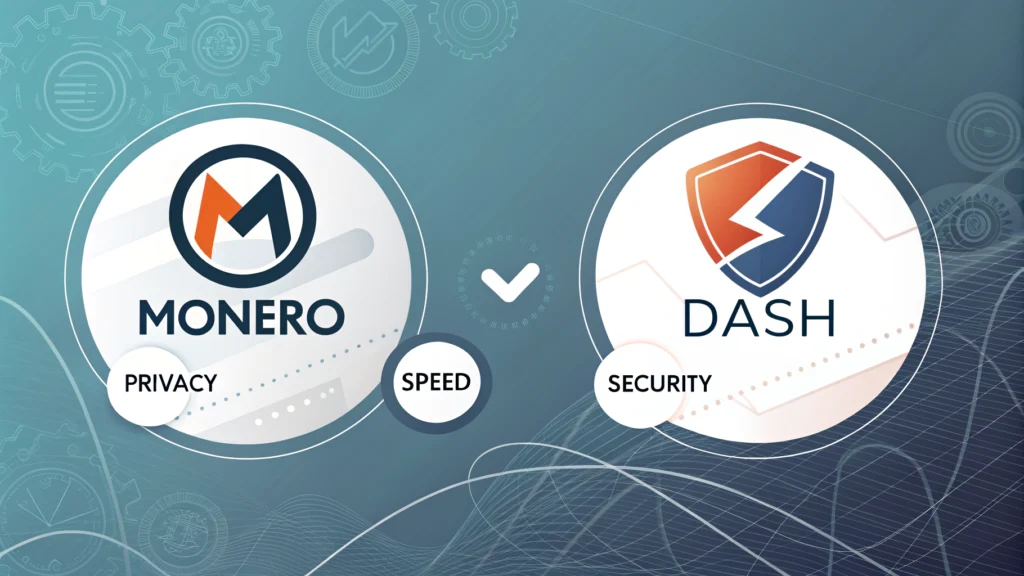In the ever-evolving landscape of cryptocurrencies, privacy remains one of the most hotly debated topics. Two projects at the forefront of this conversation—Monero (XMR) and Dash (DASH)—have taken radically different approaches to safeguarding user anonymity. While both aim to enhance financial privacy, their underlying technologies, governance models, and real-world adoption paint a fascinating contrast. Let’s dive into the battle of these privacy pioneers.
1. Privacy Technology: Mandatory vs. Optional
Monero: The undisputed king of privacy coins, Monero enforces anonymity by default. Every transaction is shielded using three core technologies:
- Ring Signatures: Mixes a user’s transaction with others to obscure the sender.
- Stealth Addresses: Generates one-time addresses for recipients, hiding their wallet details.
- Ring Confidential Transactions (RingCT): Encrypts transaction amounts.
Monero’s privacy is non-negotiable—there’s no way to trace transactions on its blockchain. This makes it a favorite for users prioritizing absolute anonymity.
Dash: Originally launched as Darkcoin in 2014, Dash offers privacy as an optional feature called PrivateSend. It uses a coin-mixing protocol that shuffles funds across a network of masternodes (collateralized nodes). While PrivateSend obscures transaction trails, critics argue it’s less robust than Monero’s cryptography. Only a fraction of Dash transactions use PrivateSend, leaving most activity publicly visible.
Key Takeaway: Monero is a fortress of privacy; Dash is a house with privacy curtains you can choose to draw.
2. Adoption and Use Cases
Monero:
- Darknet Dominance: Monero has largely replaced Bitcoin on darknet markets due to its untraceability.
- Grassroots Appeal: Embraced by privacy advocates, journalists, and unbanked populations.
- Regulatory Friction: Delisted from major exchanges (e.g., Binance, Kraken) over compliance concerns, limiting liquidity but boosting its anti-establishment reputation.
Dash:
- Mainstream-Friendly: Marketed as “digital cash” for everyday transactions. Popular in countries like Venezuela for its speed and low fees.
- Merchant Adoption: Integrated by thousands of retailers via partnerships and Dash-funded initiatives.
- Transparency Trade-Off: Its optional privacy makes it more palatable to regulators and payment processors.
Key Takeaway: Monero thrives in censorship-resistant niches; Dash targets mass-market usability.
3. Governance and Development
Monero:
- Decentralized Development: No central company or foundation. Funded through community donations and volunteer work.
- Dynamic Upgrades: Regular hard forks (e.g., 2024’s “Fluorine Fermi” update) refine privacy and scalability.
Dash:
- Masternode Governance: 4,600+ masternodes (holders of 1,000 DASH) vote on proposals funded by 10% of block rewards.
- Centralized Leadership: Dash Core Group oversees development, sparking debates about decentralization.
Key Takeaway: Monero is a decentralized collective; Dash blends democracy with corporate structure.
4. Transaction Speed and Cost
Monero:
- Speed: ~20-minute block time; slower due to privacy computations.
- Fees: Higher (~$0.25–$0.50) because of complex cryptographic operations.
Dash:
- Speed: 2.5-minute block time + InstantSend feature for near-instant transactions.
- Fees: Ultra-low (~$0.001), making it ideal for microtransactions.
Key Takeaway: Dash prioritizes speed; Monero sacrifices efficiency for privacy.
5. Regulatory Survival
- Monero: Faces existential threats from global regulators. The U.S. IRS has offered bounties to crack Monero’s privacy, while exchanges avoid listing it.
- Dash: Survives regulatory scrutiny by positioning itself as a payments tool. Its optional privacy lets it comply with AML/KYC rules on regulated platforms.
Conclusion: Privacy vs. Pragmatism
Monero and Dash represent two sides of the same coin—literally. Monero’s unwavering commitment to privacy makes it a haven for those seeking financial sovereignty, but its ideological purity comes at the cost of mainstream accessibility. Dash, meanwhile, sacrifices some anonymity to appeal to everyday users and regulators, positioning itself as “privacy-lite” digital cash.
Which is Better?
- Choose Monero if: You value untraceability above all else.
- Choose Dash if: You want fast, cheap transactions with optional privacy.
In a world where financial surveillance is escalating, both coins play vital roles. Monero guards the frontlines of privacy, while Dash offers a compromise for the pragmatic majority. The battle isn’t about winners—it’s about preserving choice in a digital economy.
